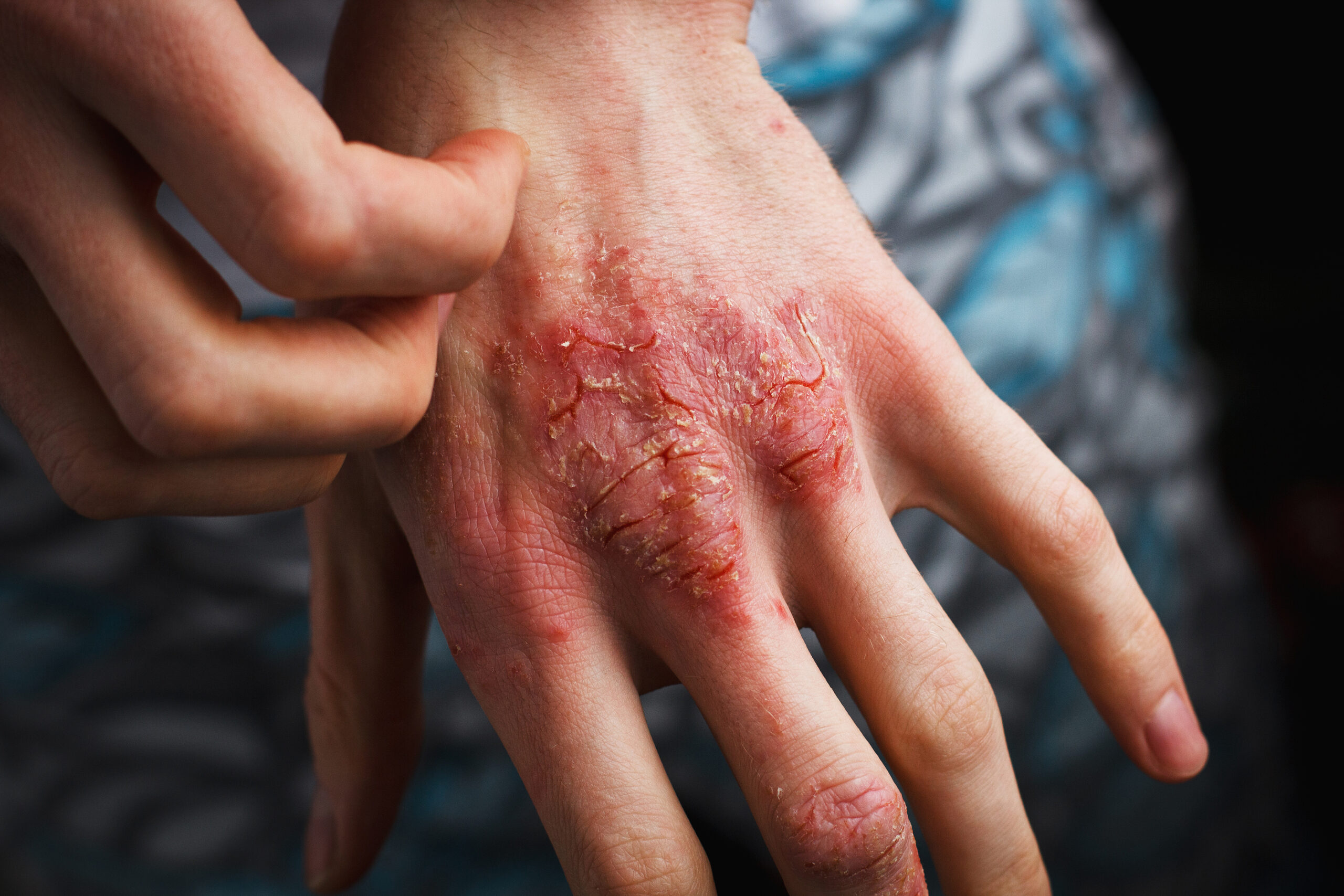Physical and mental health are inextricably bound together in a complex knot, and for people struggling with a psoriasis diagnosis, this is certainly true. A recent study found that psoriasis patients were more likely to struggle with depression and/or anxiety than the general population. As a chronic autoimmune condition, psoriasis causes thick, scaly flare-ups called plaques that can be painful and cause people to struggle with body image worries. This can make people feel like their lives are out of control as they search for help with psoriasis. Although there currently isn’t a cure, there is hope.
We have several psoriasis treatment options, and new ones are emerging all the time. The Apex Skin and Apex Clinical Research Center teams are excited to be participating in a psoriasis clinical trial right now that we hope will find even more effective, long-lasting psoriasis alternative treatment options that can bring hope and relief to our patients.
About 8 million people in the U.S. struggle with psoriasis, an inflammatory, chronic, autoimmune skin disease. For a person with psoriasis, the T-cells in the immune system malfunction. Instead of employing acute inflammation to fight infection malfunction, they cause a chronic inflammatory response: an overproduction of skin cells that cause “plaques” of thickened, raised, inflamed, red patches to form, most commonly on the knees, elbows, feet, hands, trunk, scalp, and other areas.
For about 30% of these people, the misery is compounded by a related condition: psoriatic arthritis, which causes chronic inflammation in the joints and places where ligaments and tendons connect to bones. And that’s not all:
“Some people believe it’s contagious and can be caught by touching someone with it. That’s not true,” explains Vance. “It is also not caused by bad hygiene. No amount of bathing or scrubbing will make it go away. It’s a chronic, life-long struggle, but one that we can help with.”
It’s important to know what symptoms look like and what flare-up triggers are so our patients can watch out for those and get the psoriasis treatment options that are right for them.
Psoriasis tends to run in families. It’s a chronic, life-long disorder requiring long-term care that may begin with psoriasis topical treatment and move into more systemic treatment options, depending on the severity of the condition.
Because lifestyle changes can improve or worsen psoriasis, it’s important to focus on the whole patient, including your emotional stress levels. Taking good care of yourself and your lifestyle needs on all levels is a necessary aspect of finding psoriasis relief.
Any condition that causes prolonged discomfort, lack of sleep, worry, and embarrassment is going to have a psychological and emotional impact. And in the case of psoriasis, stress can cause flare-ups to worsen. Vance understands the situation well and has worked with many patients seeking help with psoriasis in Ashtabula and beyond:
She goes on to say that psoriasis can also cause emotional stress in intimate partner relationships: “When psoriasis is involved in intertriginous (genital) areas, it may inhibit the relations a couple may have due to embarrassment of the patient.”
All of these things can lead someone with psoriasis to feel the sting of social isolation, which is why people with psoriasis are more likely to struggle with depression and anxiety.
This is why it’s so important for patients with psoriasis to be aware of their mental and emotional health and to care for that as well. Lowering stress levels can help all-around mental health, as well as removing at least one of the major triggers of a psoriasis flare-up:
It’s a strong move to get mental health therapy when you are struggling with feelings of anxiety, depression, or frustration that linger and affect your quality of life, regardless of the reason. If you feel like you are struggling to function normally, do not wait. You’re worth it, and a mental health professional can guide you with techniques and practices that can lower your stress levels.
Enlarge your support system by becoming part of a community that understands what you’re going through. Surround yourself with understanding friends and family. Find a local psoriasis support group. This is an excellent way to battle feelings of loneliness and isolation while feeling like you’re becoming part of the solution for yourself and others. You are not alone! Here at Apex Skin, we can help you find that sense of community while helping you find new psoriasis treatment options. In fact, check if you are eligible to participate in our psoriasis clinical trial, which can unlock new levels of psoriasis relief and community support.
Learning the art of practicing mindfulness through meditation and relaxation techniques is great for lowering stress levels anytime, anywhere. In fact, studies have been done specifically on practicing mindfulness and its impact on psoriasis relief. It’s one of those important lifestyle adaptations that can help you in all areas of your life.
Learn everything you can about your psoriasis diagnosis. “Education is one of the best ways to support a person by helping to guide them on their journey to improvement and feeling better,” explains Vance. “By seeking your dermatologist’s care and addressing many physical symptoms, your mental health will improve too. I always recommend follow-ups for the patient with their primary care doctor to ensure they have a well-rounded plan for care.”
Most importantly, as a chronic condition that can impact your daily life and mental health in so many ways, it’s important to partner with your dermatology provider to create a treatment plan that can improve your quality of life as much as possible. There are currently several over-the-counter and prescription psoriasis topical treatment options, as well as research discovering new, longer-lasting psoriasis treatment options for the future.
Vance explains that psoriasis, as a complicated autoimmune skin disease, requires a multi-layered approach that begins at home:
“Try to keep your rash areas moisturized as much as possible,” she urges. “This is helpful to minimize dry skin and flares in the future.” She recommends diligently applying a dermatologist-recommended moisturizer after bathing, showering, or hand washing to protect the skin and minimize dryness and itching.
Make sure to choose moisturizers that are designed for sensitive skin, added fragrances, artificial colors, or other irritating chemicals. Also, ask your dermatologist about other-the-counter products with coal tar and salicylic acid.
Vance also recommends avoiding exposure to any irritating substances: “When working with caustic agents, it is important to wear gloves to minimize any further irritation of their skin.” If you know that certain personal care products, foods, or other substances irritate your psoriasis, do what you can to minimize or avoid contact.
“Certain lifestyle choices can make psoriasis more difficult to control,” says Vance. “This is especially true with smoking, obesity, and drinking alcohol. It is important to try to maintain a healthy weight through a healthy diet and regular exercise.”
“It is important to realize that the rash may limit how you function in your work and life,” says Vance. “When limiting factors occur, it is important to recognize this because creams may not be enough. This is especially true when psoriasis covers an extensive surface area.” In this case, seeking help from your dermatologist is beneficial.
Your dermatology provider will closely examine your skin and psoriasis plaques, ask about your medical and family history, and discuss your lifestyle to determine what psoriasis treatment options would work best in your situation. These treatments may include:
Get Involved: Explore Advanced Psoriasis Treatment
Apex Clinical Research Center is currently conducting a psoriasis clinical trial exploring new options in this area and we are inviting eligible patients to participate! Not only is this an exciting way to take more control over your condition while helping us research longer-lasting, more effective psoriasis treatments, but you can also be part of the effort to help the entire psoriasis community. We hope this research will get all of us closer to a deeper understanding of psoriasis, its causes, triggers, treatments, and eventually, a cure. If this sounds exciting to you, please contact us with any questions and we can discuss your eligibility to participate!
One of the things Vance stresses for her psoriasis patients is that they are not alone. There are other folks out there who know exactly what you’re going through and who have found relief, hope, and community by reaching out to their dermatologist. She shares three stories in particular that have stayed with her:
“One of my patients came to me due to severe scalp psoriasis and topicals did not help,” says Vance. “He was constantly being harassed at work as his supervisor would tell him he was dirty all the time. He was extremely bothered by the comments of his supervisor. Since starting on systemic medications, his psoriasis has cleared up and he has received better treatment at work.”
“Another one of my patients had significant palmar plantar psoriasis and did not like to shake hands as people had asked her if her rashes were contagious,” shares Vance. “She was very embarrassed and did not shake hands after that incident. Since starting systemic treatment, her psoriasis has cleared, and she is able to shake hands again!”
“I had one patient who was a nurse and while she had psoriasis, it did not seem that bad to her,” says Vance. “The worst part for her was that she always felt like she was walking on glass while at work. It made her day very long, tiring, and difficult. Since starting on systemic treatment, her pain is gone, and it makes it easier to be on her feet all day.”
There is hope and help for psoriasis, and you don’t need to go it alone, stresses Vance:
“For anyone who feels overwhelmed, the first step is to make an appointment with your dermatologist. Write down your list of questions so you don’t forget in the moment. And bring a loved one for support to ensure you have not forgotten anything and hopefully any questions they have may be answered as well.”
If you are interested in pushing psoriasis treatment options into a better, brighter future, learn more about our ongoing psoriasis clinical trial and contact us to find out if you are eligible to participate! There is help and hope for you and everyone else with psoriasis. Apex Skin is here to help!

